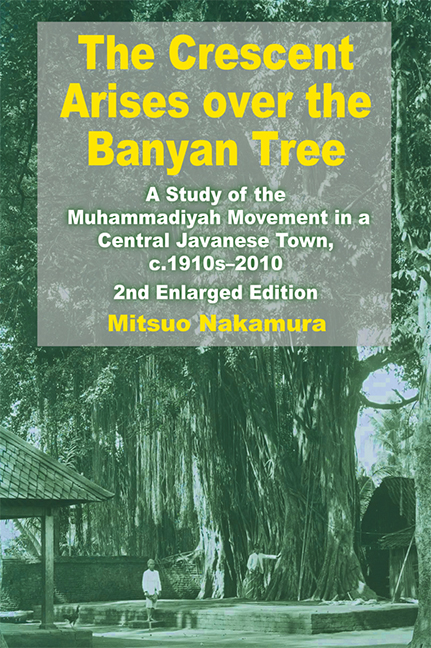 The Crescent Arises over the Banyan Tree
The Crescent Arises over the Banyan Tree Book contents
- Frontmatter
- Dedication
- Epigraph
- Contents
- List of Figures and Maps
- List of Tables
- List of Boxes
- Foreword to the Second Edition
- Preface to the Second Edition
- Foreword to the First Edition
- Preface to the First Edition
- Notes
- Map
- PART I DEVELOPMENT OF THE MUHAMMADIYAH IN KOTAGEDE, c.1910s–1972
- PART II KOTAGEDE REVISITED, 1972–2010
- Epigraph
- Map
- Introduction to Part II
- 8 Social Changes in Kotagede, 1972–2010
- 9 The Achievements of the Muhammadiyah
- 10 Internal Dynamics of the Muhammadiyah Movement
- 11 Challenges Facing the Muhammadiyah
- 12 Festival Kotagede: Conflict and Integration
- 13 The May 2006 Earthquake and Reconstruction of Kotagede
- 14 Concluding Remarks: Future of the Muhammadiyah
- Postscript to Part II
- Bibliography
- Glossary
- Appendices
- Index
- About the Author
11 - Challenges Facing the Muhammadiyah
from PART II - KOTAGEDE REVISITED, 1972–2010
Published online by Cambridge University Press: 21 October 2015
- Frontmatter
- Dedication
- Epigraph
- Contents
- List of Figures and Maps
- List of Tables
- List of Boxes
- Foreword to the Second Edition
- Preface to the Second Edition
- Foreword to the First Edition
- Preface to the First Edition
- Notes
- Map
- PART I DEVELOPMENT OF THE MUHAMMADIYAH IN KOTAGEDE, c.1910s–1972
- PART II KOTAGEDE REVISITED, 1972–2010
- Epigraph
- Map
- Introduction to Part II
- 8 Social Changes in Kotagede, 1972–2010
- 9 The Achievements of the Muhammadiyah
- 10 Internal Dynamics of the Muhammadiyah Movement
- 11 Challenges Facing the Muhammadiyah
- 12 Festival Kotagede: Conflict and Integration
- 13 The May 2006 Earthquake and Reconstruction of Kotagede
- 14 Concluding Remarks: Future of the Muhammadiyah
- Postscript to Part II
- Bibliography
- Glossary
- Appendices
- Index
- About the Author
Summary
In the context of enormous social changes since the 1970s described in Chapter 8 — urbanization, diversification and globalization — the Muhammadiyah in Kotagede is faced with major challenges such as pluralism, “culture of poverty”, and “poverty of culture”. Also, the Muhammadiyah Kotagede is operating in the national context of post-Reformasi situation, which is impacted by democratization and decentralization. The future development of the Muhammadiyah movement will be dependent upon the results of how it deals with those challenges and make positive social contributions in the ever-changing environment.
THE CHALLENGE OF PLURALISM AND DEMOCRACY
Nationally, since the official acceptance of Pancasila as the basic framework of the state in the 1985 national congress, the Muhammadiyah has made it clear that it would not seek to establish an Islamic state but to endeavour to realize an Islamic society. Its current statute states that its aim is to realize an “excellent society”(masyarakat utama) according to the teachings of Islam. The concept of “excellent society” seems to imply two aspects: the Muhammadiyah itself and Indonesian society at large. The logic of the Muhammadiyah movement is to seek an excellent society for Indonesia at large through the excellence of the Muhammadiyah. In this context, the term “utama” (excellent) reminds us of the Budi Utomo (Excellent Work) — an organization formed by the Javanese youths as the first move for nationalist movement at the dawn of the twentieth century. K.H. Ahmad Dahlan, the founder of the Muhammadiyah, was, in fact, one of the original members of Budi Utomo. Moral connotation of the term “utama” is obvious. The Muhammadiyah strives to uplift individual morality, by which to realize an ideal society.
Now the realistic task of the Muhammadiyah is to define its position and role in Indonesian society whose political underpinning (Constitution) is pluralism in terms of the Five Principles or Pancasila. The national motto has been Bhinneka Tunggal Ika (Unity in Diversity). Furthermore, the political reforms achieved through the post-Soeharto legislation have strengthened institutional framework for democracy. In this situation, Muhammadiyah must show its excellence in cooperation as well as in competition with others. In other words, the basic reference point of the Muhammadiyah is not so much the Muslim community alone as the entire Indonesian society consisting of diverse cultures and religions.
- Type
- Chapter
- Information
- The Crescent Arises over the Banyan TreeA Study of the Muhammadiyah Movement in a Central Javanese Town, c.1910s-2010 (Second Enlarged Edition), pp. 311 - 340Publisher: ISEAS–Yusof Ishak InstitutePrint publication year: 2012


